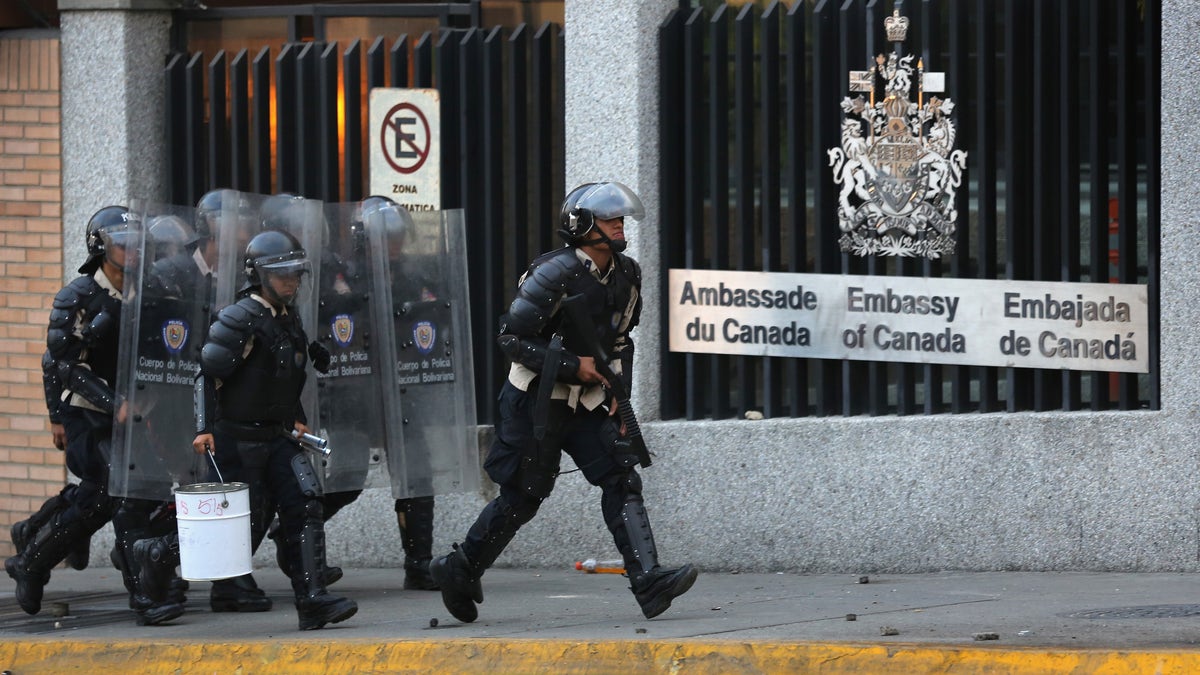
CARACAS, VENEZUELA - MARCH 06: Venezuelan national policemen pas the Canadian Embassy while advancing on anti-government demonstrators on March 6, 2014 in Caracas, Venezuela. Protesters continued to stage demonstrations nationwide against high inflation and crime. (Photo by John Moore/Getty Images) (2014 Getty Images)
Police officers in Venezuela are carrying around a hot commodity, and it’s making them a major target for violent criminals.
Venezuelan has spiraled into an economic crisis with basic commodities like food and household products hard to come by. Desperate criminals are now killing police officers because they are the only ones carrying guns.
In the first 100 days of 2015, at least 97 cops were killed in Venezuela at the hands of criminals, according to data collected by local security expert Fermin Marmol Garcia.
He says the problem has been increasing notably, and steadily, since 2012.
“At the current rate, we project that the number could rise 18 percent by the end of this year,” Marmol, who is also criminology professor at Caracas’ Santa María University, told Fox News Latino.
Earlier this week, at 8 a.m. on Tuesday, Police Officer Osmary Tavare was fatally shot in the head while patrolling the streets in eastern Caracas on a bicycle.
Two men on a motorcycle had approached her and her partner, 25-year-old Alex Gonzalez, and shot her point blank.
Tavare, 27, died instantly. Gonzales was grazed by a bullet and then shot again while running for his life. The entire sequence was caught on a security camera, including the part when one of the suspects took Tavare’s gun as she lied dying.
Nearly half of the cop killings this year, 39 of them according to Marmol’s estimates, occurred in Caracas. But Tavare was not one of them; she was killed on the 104th day.
Neither was Luis Manuel Cabrera, a 43-year-old police officer, also from the eastern municipality of Sucre, who was killed while off duty a day before Tavare.
“These events are not a coincidence. Some experts in criminology, including me, believe this is the product of a new kind of criminals. We call them “coco secos,” young thieves who use drugs before, during and after action,” Marmol explained.
“They have two goals: one is stealing valuable goods and the other is gaining prestige among other criminals, which they do by killing cops,” he added.
Marmol said “coco secos” can recognize policemen even when they are off duty because of their haircut, the way they dress and the motorcycles they use. Also, he said, cops are the perfect target because they carry valuable guns that can be stolen.
After losing two officers in two days, Sucre’s mayor requested Venezuela’s central government to declare a state of emergency in order to try and prevent more murders.
“The security of our people is on emergency. Hundreds of thousands are dying because of violence! This is unacceptable”, Mayor Carlos Ocariz wrote on Twitter after the memorial services of the fallen officers.
In all of 2014 - according to Marmol’ s estimates - 383 cops were murdered in Venezuela. In the U.S. the number was 127, according to the Officer Down Memorial Page. That’s one-third the amount, even though the U.S. population is tenfold.
Marmol points at the federal government as the only way out of this down spiraling trend.
“First, the central government has to make this issue a priority. From the president down, they have to assure [the Venezuelan people] that they will apply justice and prevent crime,” he told FNL.
“Second –he added– they have to reconfigure the national budget. Military expenditure is two times higher than homeland security expenditure. That is not logic in a country that registers more than 24.000 murders per year.”
Not only does Venezuela have an 80 percent deficit regarding patrolling personnel, Marmol said – also only 6 out of every 100 crimes go unpunished.
But public safety doesn’t seem to be at the top of the government’s list of priorities. According to our personal records, in his two years as president, Nicolas Maduro has appeared on TV in 69.5 percent of the days, and yet the last time he spoke about this issue on national TV was on November 25, 2014.
After that, Maduro has spent most of his air time speaking about the diplomatic tensions with the U.S., the country’s financial troubles and the numerous social programs put in place to alleviate the poor.







































